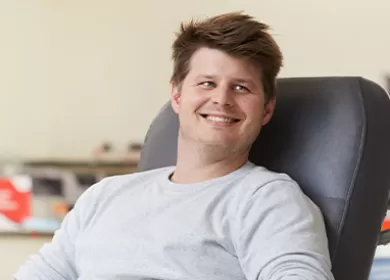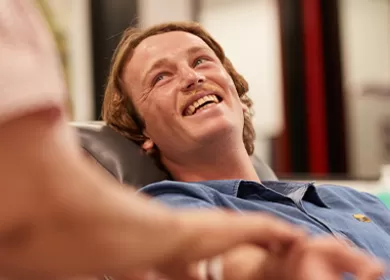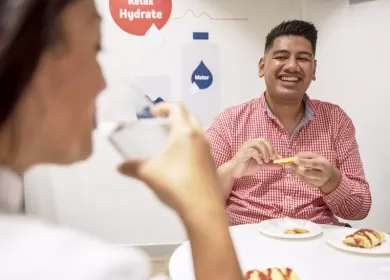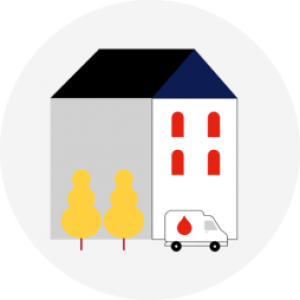For Beau, Lifeblood is more than blood
Many Australians will be familiar with Lifeblood for the work we do supplying Australia’s most vulnerable with ‘lifesaving’ blood. But to people like Beau, Lifeblood means so much more.
Beau was born with cystic fibrosis, a genetic disorder that affects the lungs and other organs. Currently, there is no cure for cystic fibrosis and while the medical community has made incredible strides in treating the disease, it is terminal. For Beau, it felt like he was drowning in his own body. The disease attacked his lungs, causing severe shortness of breath that was so extreme he couldn’t complete basic tasks without assistance. As his condition worsened, Beau was placed on the organ transplant list, his lungs were beginning to fail and with no cure available the only option left was a double lung transplant.
The success of a potential lung transplant for Beau would depend on the match between his body’s tissue and the donor’s tissue being as close as possible, to avoid his body rejecting the organ in the future. A process which - to put it simply - is very complicated.
Within Lifeblood, there is a team of experts responsible for transplantations and immunogenetics. When a donor becomes available, this expert team performs a 10-hour tissue typing process to help match a donor with a potential recipient. Working in close collaboration with their colleagues at DonateLife, the team tests the donor and the recipient to make sure the pair are compatible. The team is on call 24/7 to receive blood samples from any potential donor so their testing process can find the most suitable match. And at 2 am, Beau was lucky enough to be told that his match had been found.
Since receiving his new lungs, Beau’s life has changed for the better, or as he would say, he’s “definitely not complaining.” Feeling stronger and fitter than ever, Beau’s been able to return to work, regain his independence and start living a life he loves, hanging out with friends, walking the dog, and watching the mighty Cowboys in the NFL. But Beau’s journey didn’t end here and at Lifeblood, we wanted to be ready to support him in whatever way we could.
A few months after receiving his new lungs, Beau’s doctors became concerned about the level of antibodies in his system. Transplanted organs are often at increased risk of infection from viruses and bacteria or rejection by the body’s own immune system. To combat this, Beau’s doctors treated him with a type of immunoglobulin therapy created using plasma from Lifeblood donors. As Beau sees it, he was still getting used to this new organ and the immunoglobulin therapy just helped his body, ‘figure it all out.’
A year after his transplant, we caught up with Beau to see how he was doing and asked him if there was anything he wanted to say to his donors. Being the straight talker that he is, Beau knew exactly what to say, “You guys and girls do an amazing job. And there’s probably not enough thanks out there for you.” When asked what he would say to anyone who was considering becoming a donor, Beau didn’t disappoint, “I’d just say “Do it.” It’s a quick and easy process and that generosity then enables someone else the opportunity to fulfil their hopes and dreams and continue living.”
We couldn’t agree more Beau.
If you’d like to help people like Beau, you can register to become an organ and tissue donor at donatelife.gov.au – it takes less than a minute, all you need is your Medicare card.




